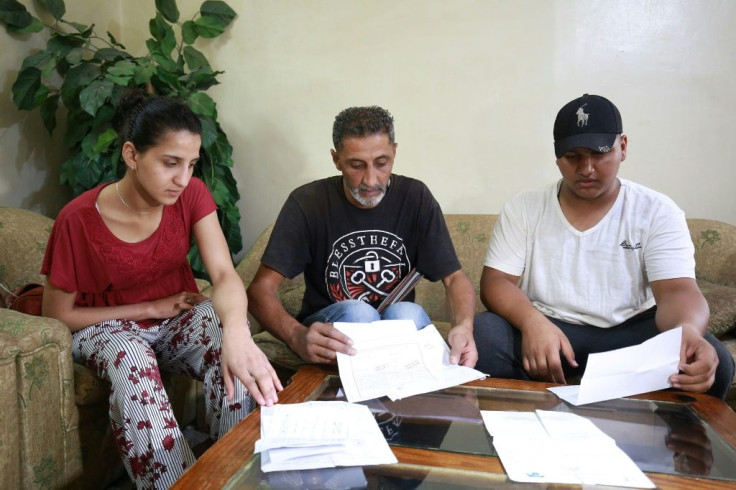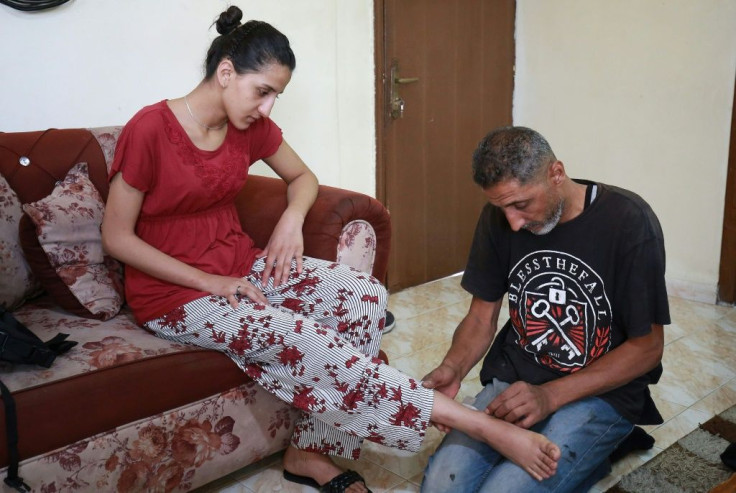For Poor Jordanians, Debt Trap Is Often A Prison Cell
Cash-strapped and struggling to care for his two disabled children, Mohammad Sabha took out a loan. Now he fears ending up in a Jordanian prison because he can't repay it.
He would join thousands already behind bars for similar infractions in the kingdom, where debt law is draconian and disproportionately punishes the poor.
"This is one of the most serious social problems in the kingdom," said Jordanian economist Musa al-Saket of the Phenix Center for Economics and Informatics Studies in Amman.
Jordanians in financial trouble can't resort to declaring personal bankruptcy.
Non-payment of even small debts carries up to 90 days' jail time and a bounced cheque can lead to a year in prison.
Sabha's daughter, Fathia, 17, suffers from a paralysed right arm and leg, and his son Khader, 18, lost an eye in a fall as a child and has to change his ocular prosthesis regularly.
The 43-year-old father has a job in a factory making aluminium products and his wife works in a cleaning service. Together they make about 650 dinars ($930) a month, which barely covers their expenses.
In a country where only civil servants and pensioners have health insurance, Mohammad is burdened with grinding debt.

"My wife and I both work, but we are forced to borrow to treat our two children because the care costs 5,000 dinars ($7,000) a year and we just don't have that," Sabha said.
"To take care of our children, we have borrowed 12,000 dinars over the past five years from five credit institutions," he said.
"We are harassed by creditors who have gone to court. Today, we are desperate."
Sabha has already been in prison over unpaid debt, and he says the only reason he is free right now is the Covid-19 pandemic.
The public health crisis led the government to declare a moratorium in March on prison sentences until the end of the year, a temporary reprieve that only applies to people with debts below 100,000 dinars ($141,000).
Sabha is convinced that as soon as the law comes back into force, he and his wife will be the first to go to jail.
"The law needs to be revised because imprisonment benefits neither the creditor nor the debtor," he said.
"What is his benefit if he puts me in jail? Who will take care of my sick children?"

In a report in March, the New York-based group Human Rights Watch (HRW) said more than a quarter of a million Jordanians are currently facing legal claims of defaulting on their debts.
Citing official statistics, it said the number of people facing imprisonment for unpaid debts has risen about ten-fold in recent years -- from 4,352 in 2015 to 43,624 in 2019.
About 16 percent of the prison population, or around 2,630 inmates, were behind bars for unpaid loans and writing bad cheques in 2019, it said.
"Under Jordanian law, if you take out a loan and can't pay it, you go to jail," said Sara Kayyali, a Middle East researcher at HRW.
"In many cases, people take out loans to pay for rent, groceries, medical bills. But instead of helping those in need, the authorities jail them."
HRW argues that as most countries have abolished prison sentences for debt, Jordan should follow suit and scrap Article 22 of the law while directing judges to explore alternatives.
Another Jordanian stuck in the debt trap is Majdi Mohammad, a street vendor of perfumes and cosmetics.
When the pandemic hit, he said, he had only 247 dinars ($350) left to pay back the 6,000 dinars he had borrowed in 2018.
"But my work stopped in March 2020 when people cared more about food than perfumes," said the 53-year-old.
"The lender filed a complaint with the court and I'm waiting for the verdict. But what will he gain if I am in jail?"
He said that thousands of Jordanians had fled to Egypt, Turkey and Georgia to avoid prison sentences.
"Some live in exile in difficult conditions," he said. "They sleep in public parks or under bridges."
A committee was formed in Jordan in 2019 to address the problem and defend indebted people like Mohammad.
"We seek to put pressure on the government to change the law," a member of the committee, Mahmoud al-Qatami, told AFP.
"The debtor should not be imprisoned together with criminals. Imprisonment violates human dignity."
© Copyright AFP 2024. All rights reserved.





















